Greetings, book and treat people! It’s been cool and rainy here in the hills of Western Mass and yes, you guessed it, this weather makes my heart sing. I planted most of my garden over the weekend—pots of herbs and nasturtiums, lots of basil, lupines and rudbeckia—and while I’m sure my plant babies are longing for long, hot, sunny growing days, I am not.
The June Books for Trans Rights Fundraiser is ongoing—thank you to everyone who has participated so far! I’d really love to raise some more money for some rad orgs throughout the rest of Pride. There are so many amazing books available, including two of my favorite poetry collections of the year, a cookie cookbook, some beloved queer fantasy and sci-fi, and more! You can check out the books and make your donations here. If you can’t spare any money right now, I get it—maybe you could share the fundraiser with someone you know who loves queer books instead.
I listened to Pageboy over the weekend, and I was not expecting to love it as fiercely as I did. It got me thinking about queer and trans chronology and the lineage of nonlinear trans storytelling. Queer and trans lives often unfold on different timelines, and these three books, each in their own way, are written with those timelines in mind. They’re not concerned with being legible to the straight world.
The Books
Zami by Audre Lorde (Memoir, 1982)
But my experience with people who tried to label me was that they usually did it either to dismiss me or use me.
This is only the fourth Audre Lorde book I’ve read (the others being The Cancer Journals, Sister Outsider, and The Black Unicorn). It’s different from her other work. It feels less polished, a little looser, a little messier.
I think a lot about queer ancestors—how we treat them, how we put them on pedestals, how we look to them to teach us how to be, how to survive, how to act. I think about what a small fraction of their lives we truly know—what small bits of their hearts and messes, their joys, their struggles, their relationships. I think about what it means to honor their whole complicated selves. I think about what we’re doing when we label Lorde as beloved ancestor, and I wonder if sometimes we aren’t honoring or seeing her, but dismissing or using her. I wonder what we owe the dead, what kind of care, what questions.
This book, like all of Lorde’s work, is full of her scholarship. There’s a lot of heaviness in it—childhood grief and trauma, racism, familial strife, the exploitation she experienced as a factory worker in her late teens and early twenties, the abortion that vaulted her violently into adulthood (her writing about this, especially how hard it was to get an abortion and the pain and alienation she felt during the process, is absolutely gutting). There is so much smart feminist thought, and so much wisdom:
However imperfectly, we tried to build a community of sorts where we could, at the very least, survive within a world we correctly perceived to be hostile to us; we talked endlessly about how best to create that mutual support which twenty years later was being discussed in the women’s movement as a brand-new concept. Lesbians were probably the only Black and white women in New York City in the fifties who were making any real attempt to communicate with each other; we learned lessons from each other, the values of which were not lessened by what we did not learn.
Also, there is Lesbian Drama. Her first intense romance and all its messes. Her sex life. The girls she’s crushing on. The parties she throws on New Year’s Eve, and the hungover mornings after. What she has for dinner. How she pays the grocery bill. Her job. All the apartments she loves and the ones she can’t stand. Dancing at gay clubs in the Village. Affairs! “Should we open up our relationship!?” (This is not a direct quote, I’m paraphrasing.) Endless processing. Tender new friendships. Heartbreak.
So much of this book is simply Lorde, living her life in various cities (mostly New York, but also cities in Mexico and Connecticut) as a young Black lesbian trying to figure out who she is and what she wants. This is what I loved the most. She is an icon, yes, and she left behind an incredible body of work (though, like all the work of all brilliant scholars, hers is not perfect or above reproach). She is a beloved queer Black ancestor and also she was just a human doing small human things. It was humbling to glimpse a little bit of her small, intimate human life, her floundering twenty-something self.
I don’t know what we owe our dead, our beloved queer ancestors. But I think part of what we owe them is our attention, our willingness to see all the pieces they did leave behind—broken, messy, unrefined, in process.
Pageboy by Elliot Page (Memoir, 2023)
I picked this book up because of course I did, but I was not expecting to fall so ferociously hard for it. I often enjoy celebrity memoirs, though I rarely love them. I like Elliot Page and I’m familiar with some of his work, but I also don’t care much about pop culture so it’s not like I was dying for gossip about his career in Hollywood. Happily for me (and you, and all of us), this is not a typical celebrity memoir. Page does write about his experiences (often harrowing) on various films, and he gets into it about his relationships with some famous actors, but at heart this is a vulnerable coming-into-self book, not a juicy tell-all. It’s a story told on a queer, trans timeline. I was blown away by the nonlinear structure.
Page doesn’t move smoothly from his childhood to his early acting career, from his vault into fame with Juno to the years he spent closeted, from his coming out as gay to his coming out as trans. He writes about all of that, but not in order (or, more accurately, not in an order that’s easily legible to the straight, cis world). It’s not a chronological journey. Queer journeys often aren’t. Instead, this book is a beautiful jumble of moments—devastating, mundane, joyful, terrifying, full of wonder. Memories follow memories follow memories; the past tangles with the present.
He jumps from the freedom of finally being able to date openly as a gay person to moments of childhood trauma to boyhood joy to the deep despair caused by dysphoria to an intense relationship in his late 20s to his high school crush to the euphoria of being at a pool in swim trunks after top surgery.
There is this desire, this nasty instinct, I think, in cis people, in cissexist society, to bifurcate trans lives. To cut them in half. To look for the “before” and “after” photos (gross). This is reflected in the ways we so often talk about transition, the ways we expect trans people to perform, the ways we expect trans people to tell their stories (life is bad—>transition—>life is good). As if what comes before coming out isn’t real. As if a trans life isn’t a trans life before someone finds the words to describe who they are and how they feel.
Queer people also experience this, though to a lesser extent. Coming out is a bifurcation disguised as a right of passage. We treat coming out the same way weddings get treated in fairytales: a celebratory endpoint, not a moment in a life. We talk about it like it's the goal, this crossing over from despair into joy, from hiding into openness, from shame into pride. This whole idea is so violent. It reduces queer and trans lives into simple, easily legible journeys. It ignores the nuances and complexities of intersectional identity. It does not make space for joy that is illegible from the outside, for curiosity, for deep questioning, for endless movement.
By refusing to write a linear trans narrative, Page refuses to bifurcate himself. He refuses to cut himself in two. The whole book is a trans memoir; his whole life is a trans life. There is a lot of change and growth and transformation, but there is no “before and after”. There is just ongoingness.
It’s a heartbreaking book, full of so many kinds of pain—transphobia, homophobia, emotional abuse, sexual violence, the self-loathing and despair that comes with learned and inherited shame, the agony of gender dysphoria. It is also full many moments of joy and courage and connection and hot queer sex. It is, absolutely, a memoir about a journey into self, about the incredible relief and ease of finally being out and trans in the world. Transition (though it’s not at all the focus of this book) is Page’s destination. So is falling in love, going to therapy, having a painful but important conversation with his dad, going to a Peaches concert at 16. There are a thousand destinations. The trajectory is infinite.
I suspect there are people who are going to want something different from this book, who are going to say the nonlinear structure is hard to follow, who are going to make transphobic comments about how they wish Page focused more on certain parts of his life (hello, cishet entitlement and voyeurism), who are not going to see the trans beauty that is this narrative, the glorious singing fuck you of it. (In fact, they are already doing so on Goodreads, and I am seething.) I am so grateful that Page wrote this riotous book anyway, that he filled all its messy pages with queer and trans chronology, that (to the extent a highly visible celebrity can) he shoved the cishet gaze where it belongs: in the trash.
The audiobook, which he reads, is wonderful. It made me want to pick up Bluets immediately (he quotes it extensively in one incredibly poignant section). I cried a lot, and thought a lot about other books I’ve read recently that feature expansive queer and trans chronology and anti-bifurcation: People Change by Vivek Shraya, None of the Above by Travis Alabanza, and Hijab Butch Blues byLamya H.
Horse Barbie by Geena Rocero (Memoir, 2023)
This is a moving, poignant, and often funny memoir about Rocero’s childhood in the Philippines, her rise to national stardom as a trans pageant queen, her move to the U.S. and subsequent modeling career, much of which she spent closeted, her eventual choice to come out, and her work as an activist and artist.
There’s so much in this I loved: Rocero’s openness and sense of humor and the way she makes me care about all sorts of things (modeling, dance parties, pop culture, fashion) I don’t usually find interesting. What she has to say about trans mentorship and sisterhood. The stories she tells about her relationship with her mother, which she infuses with so much tenderness, silliness, and complexity. Her analysis of Western homophobia and transphobia and its affect on trans culture in the Philippines, and what that actually feels like to live through and with. Her sense of beauty, and her descriptions of the joy she finds in making art with her body. This is a powerful, deeply embodied book. Even when she’s writing about the hardest, most painful experiences, Rocero’s sense of purpose, and the delight and pride she takes in the life she’s made, shines through. There is a lot of trans joy.
What I most appreciated, though, is the nuance with which Rocero discusses her experiences as trans woman in the Philippines and the US. In the Philippines, as a pageant queen, she’s culturally accepted and celebrated. Trans pageants have a long history there, and she’s free to be herself in many ways. She has to deal with transphobia, for sure (and she goes into detail about where this comes from—colonialism and Western imperialism), but she also finds a deep sense of sisterhood, family, and belonging with her pageant family. She isn’t legally recognized, and she can’t change her name or gender markers, but she also doesn’t have to hide.
In the U.S., soon after she immigrates to California, she’s able to legally change her name and access gender-affirming care—this is in the late 1990s and early 2000s. But as soon as her modeling career starts to take off, she makes the choice to stay closeted for her own safety. Being an out trans model is unheard of. The U.S. gives her legal recognition but the risk of violence she faces—from men she meets at bars, photographers and modeling colleagues, potential lovers and friends—is immense.
Rocero, like Page, though in a different context, refuses to bifurcate herself. Immigrating to the U.S. does not “save” her. The U.S. is not the promised land and the Philippines are not “backwards”. She finds deep love and acceptance in both places. She faces systemic oppression in both places. She is also made of both places—she writes so beautifully about her loving family (both in the U.S. and the Philippines), her connection to the trans culture and ancestral, pre-colonial gender identities of her homeland, her love of dancing, the queer Filipino slang she speaks with her friends. She tells her story chronologically, but it’s not linear in the sense that she doesn’t move from lost to found, from grief to joy, from broken to fixed. She comes into herself and her power in so many small ways throughout her life, and it’s a joy to listen to her tell it.
She narrates the audiobook, which I highly recommend.
The Bake
Strawberry Lemon Stripe Cake
This recipe comes from one of my favorite cookbooks for baking projects: Sweet by Yotam Ottolenghi and Helen Goh. I wanted to bake something festive and springy for my bestie’s birthday, and this cake was perfect.
You make a jelly roll sponge, fill it will luscious buttercream, roll it up, turn it on its side, frost it, and drizzle some fruit puree on top. The original recipe calls for black currants instead of strawberries, but other than swapping the fruit, I baked it as is. I would have preferred it to be a little neater, but it was delicious. No one at the party complained.
Because of the way it’s rolled, you get these fancy vertical stripes when you cut into it. The buttercream is made with a simple strawberry puree (delicious) and the sponge is light and lemony.
Worth It?
Yes! It was delicious. Everyone at the party was suitably impressed. I had a blast making it. It took some time to make all the components—fruit puree, buttercream, sponge—and assemble them, but if you’re looking for a great baking project, I recommend it! The recipe was easy to follow and everything did what it was supposed to do.
The Bowl & The Beat
The Bowl: Quick Asparagus & Mushroom Pasta
Asparagus season around here is starting to wind down, which is fine, because now I’m mostly eating strawberries (of course you can make a meal of them) and soon I’ll be on to peas. Happily, this extremely simple pasta would be great with peas, too!
Fry a few strips of bacon, remove them from the pan, and add a bit of butter to the remaining fat. If you don’t like or eat bacon, don’t fry any. Just toss a hunk of butter in a pan. Slice a big handful of mushrooms—any kind—and sauté just until they’re starting to turn brown. Wash a bunch of asparagus, snap off the ends, cut the spears into small pieces, and add them to the pan. Cook for just a few more minutes, to ever-so-slightly cook the asparagus. Season with salt, pepper, the zest of one lemon, and a few splashes of lemon juice. Toss with your favorite pasta and your favorite cheese. I used Parmesan because it’s what I had.
The Beat: Chlorine by Jade Song, read by Catherine Ho and Imani Parks
This is a beautiful and very sad novel about Ren, a queer teenager who longs to become a mermaid. It’s not a metaphor—she begins by explaining that she was never a girl, and that she’s found a way to return to/become her true self. The story is how she gets there, I guess. She’s a competitive swimmer, she has a crush on her best friend but has sex with the boys on her team instead of perusing her, her coach is a terrible, creepy asshole. It’s weird and compelling and I’m not sure what’s going to happen but I am all in for Ren. I love the way Song writes about loneliness and bodies and queer desire.
The Bookshelf
In my ongoing efforts to be kind to and not overwork myself, I’m shortening the Bookshelf this week.
Around the Internet
On Book Riot, I wrote about how I’m slowing making my way back to reading SFF. I made a list of some brilliant nonfiction books by trans & nonbinary Asian authors, and a list of some of the best books you’ve never heard of from the 2000s. And I wrote about why I don’t review comfort books (in case you’re wondering why I rarely write about romance here).
Queer Your Year
News & Announcements
Congrats to Wes, who won the May raffle! I am so excited to tell you about the June prize: a bundle of cards and stickers from one of my favorite queer artists, Nicole at Radical Emprints. She is so thoughtful, and her work is joyful and radical. The bundle includes: 1 Rage is Tinder, Hope is Fuel print; 4 Queer Love Keeps Out the Cold postcards; 4 Abolition Means Believing postcards; 3 Queer Love Keeps Out the Cold stickers; and 3 Queer Flirtations stickers.
As always, don’t forget about the super fun prize packs! Everyone who submits a game card gets one, and they ship internationally. And please come join the Queer Your Year discord if you haven’t already! If you’re stuck on a prompt (or just want to chat about queer books), it’s the place to be.
Recs!
Every month is Pride around here, but I thought I’d give some Pride-ish recs this week anyway. I know lots of us could use books about queer joy right now. And it’s always a good time to celebrate Arsenal Pulp Press, but if you’re looking to stock up on some amazing books, their whole LGBTQ2S+ catalog is 30% off through the end of June! Go wild! You won’t regret it!
Prompt 17: A book about queer joy
Both Pageboy and Horse Barbie are full of queer joy (though they also get into some really hard stuff). One of my all-time favorites is Blood, Marriage, Wine & Glitter (and really anything S. Bear Bergman writes). Any Other City by Hazel Jane Plante is chock-full of queer and trans joy (again, also the hard stuff). Freedom House by KB Brookins and More Sure by A. Light Zachary are both poetry collections awash in queer joy. And two YA novels I liked a lot but haven’t reviewed: Always the Almost by Edward Underhill and Friday I’m in Love by Camryn Garrett (just look at that cover)!
Prompt 44: A book published by Arsenal Pulp Press
Earlier this month, I wrote a love letter to Arsenal Pulp featuring 20+ of my favorite APP books. I don’t do favorites, but here are three of my most beloved:
Butter Honey Pig Bread by Francesca Ekwuyasi (fiction)
Care Work by Leah Lakshmi Piepzna-Samarasinha (nonfiction)
A Place Called No Homeland by Kai Cheng Thom (poetry)
The Boost
One of my favorite people on Insta, Surabhi (@surabhi.reading), is raising money this month for the rad org Lavender Phoenix. Read about what it means to her here, and donate here if you’re able!
Last year disabled writer and activist Alice Wong experienced several medical emergencies. The community came together to fund her care needs, and since the system is still broken and still ableist, she is again raising funds for continuing at-home care.
I have long admired my local queer-owned community apothecary shop, Community Care Apothecary (though I have yet to visit—hopefully soon). Reede brings endless queer joy and herbal wisdom to me via Insta, and soon they’re returning to Armenia, their ancestral homeland, for the first time. To help cover the cost of closing the shop while they’re away, they’re doing a sweet raffle! Check it out here.
As always, a little bit of beauty to send you on your way: Stormy grey skies and vibrant green hills: my favorite June landscape.
Catch you next week, bookish friends! I have no idea what next week’s essay will be about, but if you want to read it, you can subscribe here.






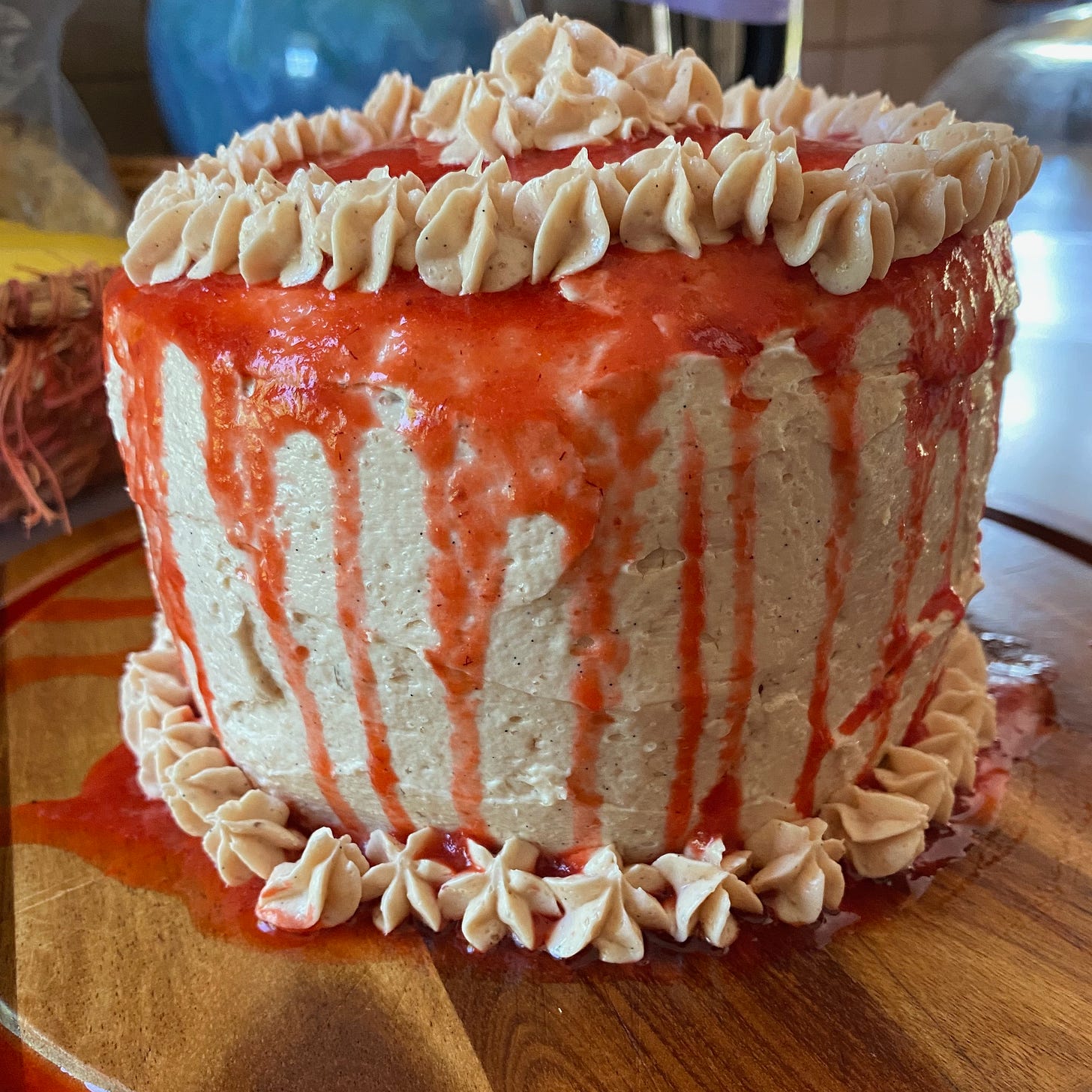
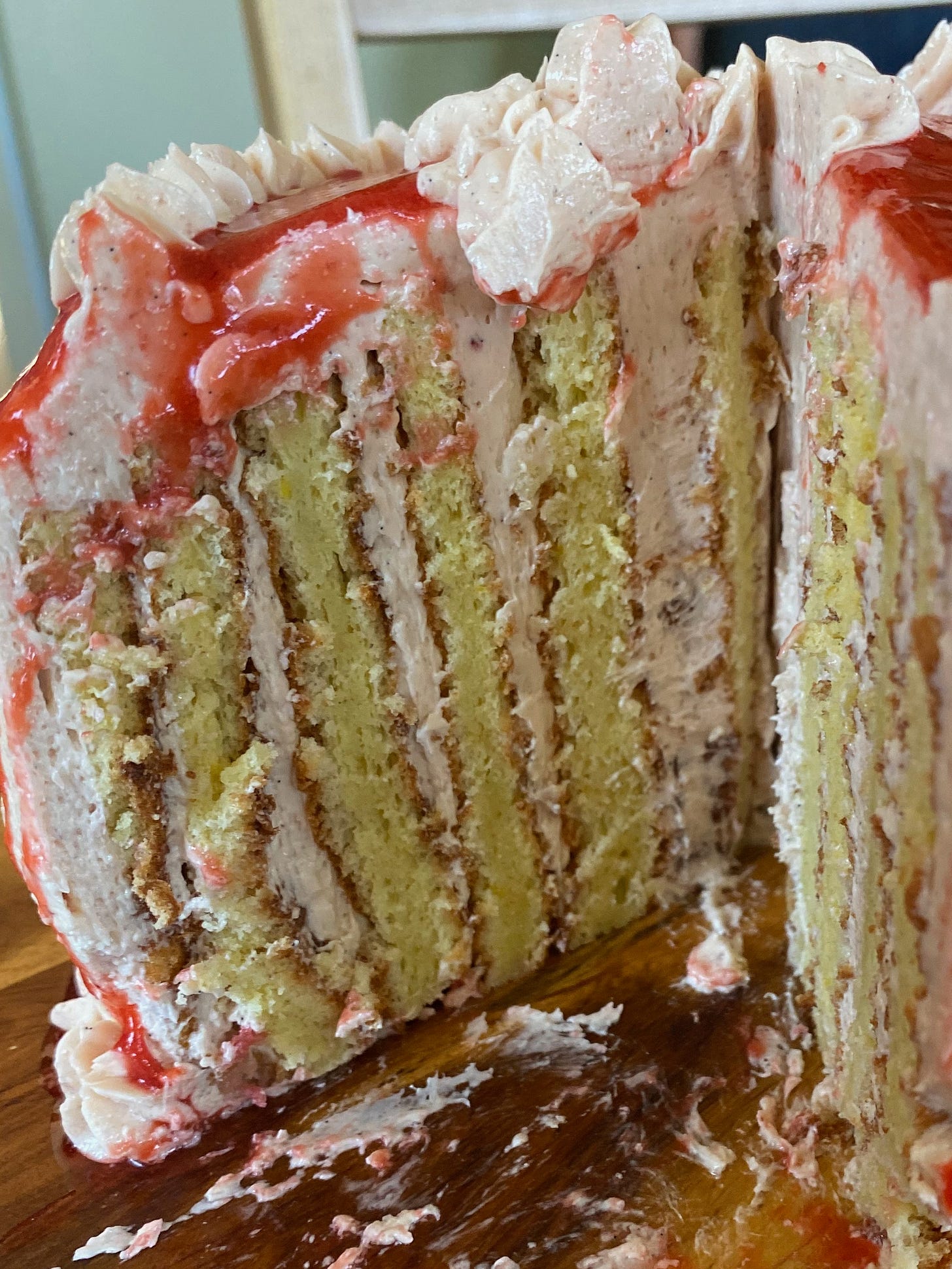

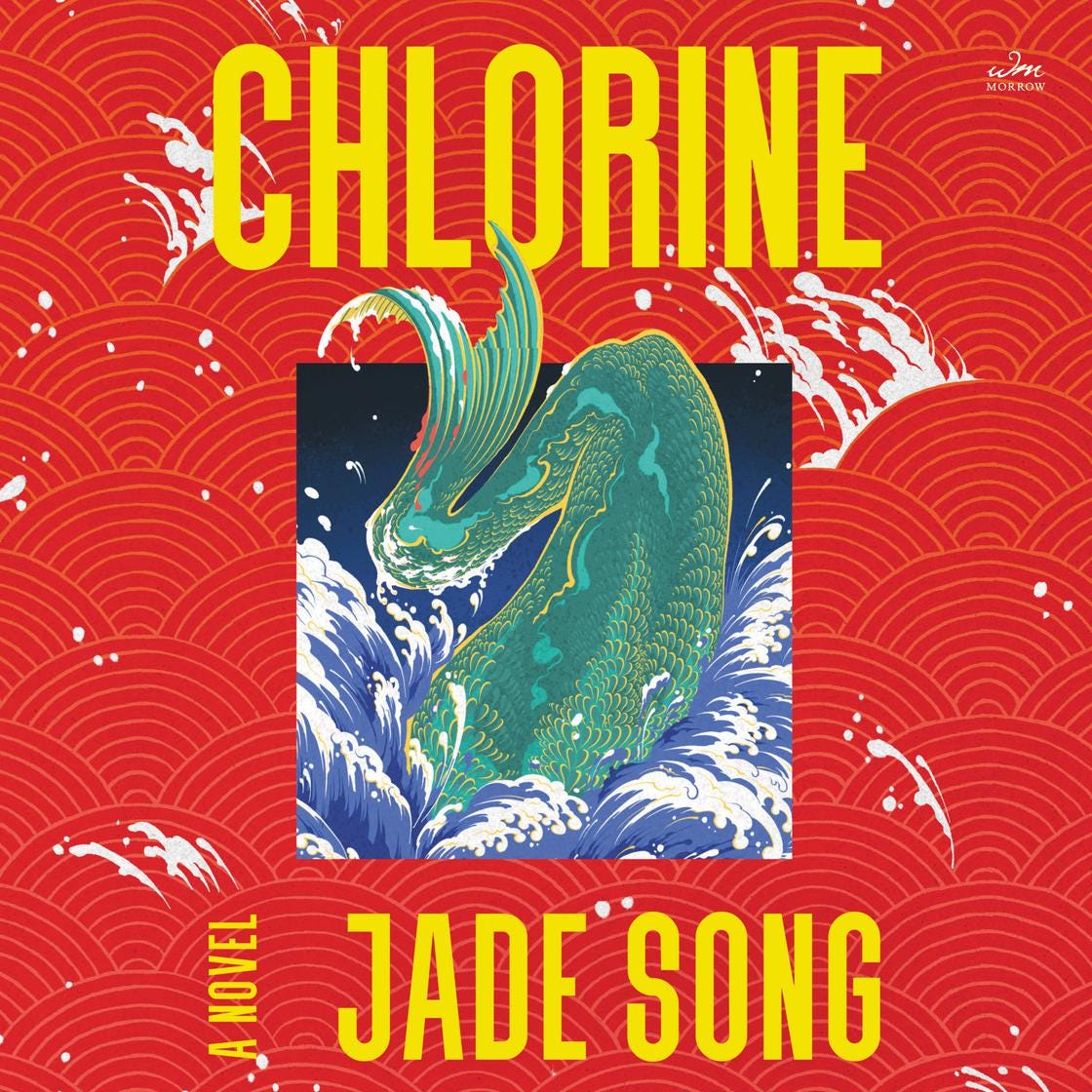
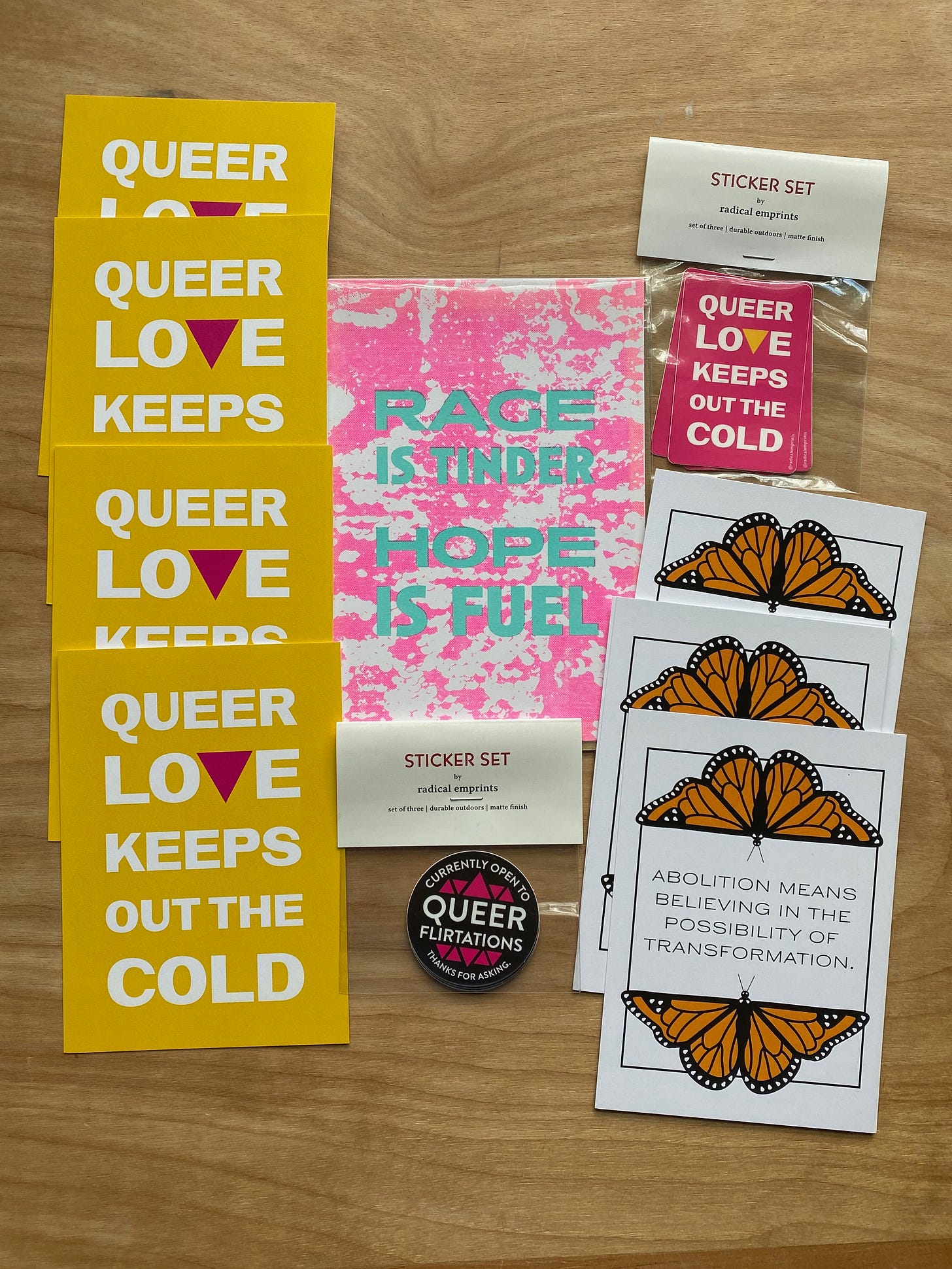
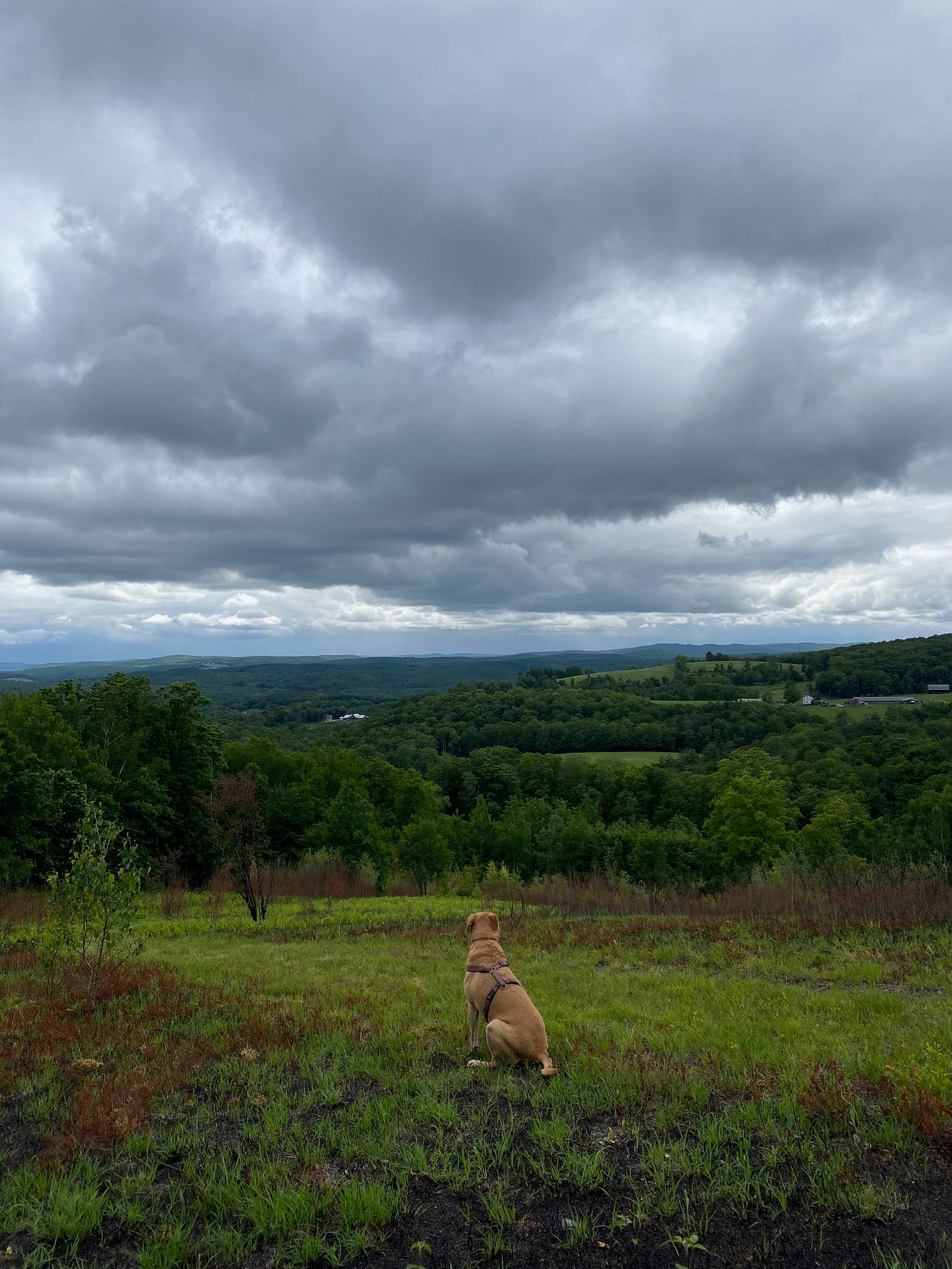
This is the second review I've read this week for Horse Barbie, and am now thoroughly sold! Thanks for the recommendation!